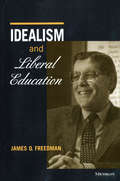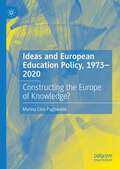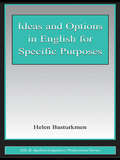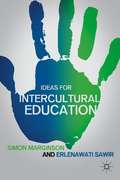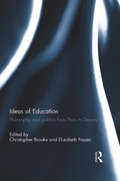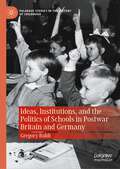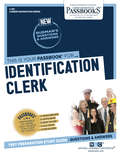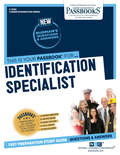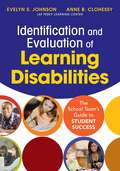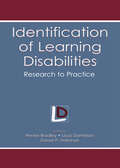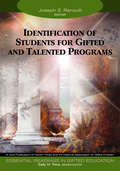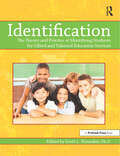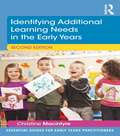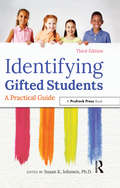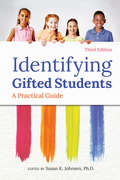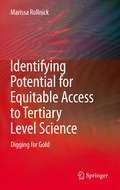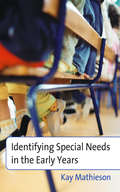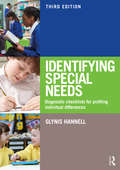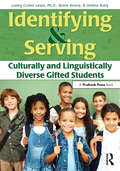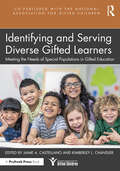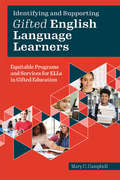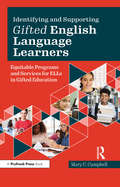- Table View
- List View
Idealism and Liberal Education
by James O. FreedmanWith refreshing eloquence, James O. Freedman sets down the American ideals that have informed his life as an intellectual, a law professor, and a college and university president. He examines the content and character of liberal education, discusses the importance of letters and learning in forming his own life and values, and explores how the lessons and the habits of mind instilled by a liberal education can give direction and meaning to one's life. He offers a stirring defense of affirmative action in higher education. And he describes how, in the midst of undergoing chemotherapy for cancer, liberal education helped him in that most human of desires--the yearning to make order and sense out of his experience. Part intellectual biography and part examination of the world of higher education, Idealism and Liberal Education is a quintessentially American book, animated by a confidence that reason, knowledge, idealism, and the better angels of our natures will further human progress. Freedman offers, as models for shaping one's life, profiles of some of his heroes--Thurgood Marshall, Alexander M. Bickel, Václav Havel, Louis D. Brandeis, Felix Frankfurter, Hugo L. Black, Flannery O'Connor, Eudora Welty, George Orwell, Edmund Wilson, Martin Luther King, Jr., George F. Kennan, Ralph J. Bunche, and Harry S Truman. This volume speaks to all Americans who are drawn to the power of liberal education and democratic citizenship and who yearn for the inspiration to lead thoughtful, committed lives.
Ideas and European Education Policy, 1973-2020: Constructing the Europe of Knowledge?
by Marina Cino PagliarelloThis book analyses the transformation of European Education Policy from 1973 to 2020. In doing so, it offers a unique insight into the changes of European education from a predominantly national concern to a supranational policy framework, driven by an economic discourse concerning productivity and employability. The book shows that the idea of the “Europe of Knowledge” did not originate in the Lisbon Strategy of 2000, but rather was the result of a gradual development that started in the mid-1980s. This begun with the establishment of a specific problem definition of education as a solution for Europe’s lack of competitiveness, a definition that was incrementally constructed by the European Commission and the European business community. Highlighting significant and unexplored questions such as the role of European transnational business in education and the role of the “problem entrepreneur” in defining policy issues, this book will provide a comprehensive perspective on European Education Policy that will be of interest to all students of European Politics, Education Policy, and Public Policy.
Ideas and Options in English for Specific Purposes (ESL & Applied Linguistics Professional Series)
by Helen BasturkmenThis volume presents a range of views about language, learning, and teaching in English for Specific Purposes (ESP). Its purpose is to go beyond individual cases and practices to examine the approaches and ideas on which they are based. The aim is for readers to adopt an analytical stance toward the field and to identify current perspectives in ESP and the ideas driving them.Ideas and Options in English for Specific Purposes does not promote any one approach, but rather identifies and illustrates those in evidence today. The main emphasis is on the links between theory and ESP teaching and research. Ideas from linguistics, sociolinguistics, education, SLA, and social theories are described. Links are then made between these ideas and ESP course designs, instructional materials, and research projects. Thus the book moves back and forth between descriptions of theories, teaching practice, and research.Part I introduces the book's approach to description of ESP and the framework used to investigate it. Part II examines ideas of language, learning, and teaching in ESP. Recognizing that ESP is taught in many different countries and contexts, the author draws on a wide range of examples of teaching practice and research from around the world and from different branches of ESP, including English for Academic Purposes, English for Professional Purposes, and English for Vocational Purposes. From Chapter 3 onward, each chapter includes Questions for Discussion and Projects, to encourage readers to research and analyze the practices of ESP in their own contexts and to consider the ideas they draw on in their own teaching.This text is geared toward graduate-level TESOL education courses.
Ideas for Intercultural Education
by Simon Marginson Erlenawati SawirTakes a critical look at present approaches to international education, focusing on the intercultural potential that it offers but mostly fails to deliver. The underlying premise of this profound, engaging book is that international education can be a transforming intercultural experience for hosts as well as visitors.
Ideas of Education: Philosophy and politics from Plato to Dewey
by Christopher Brooke Elizabeth FrazerThere has always been a strong relationship between education and philosophy - especially political philosophy. Renewed concern about the importance and efficacy of political education has revived key questions about the connections between the power to govern, and the power to educate. Although these themes are not always prominent in commentaries, political writings have often been very deeply concerned with both educational theory and practice. This invaluable book will introduce the reader to key concepts and disputes surrounding educational themes in the history of political thought. The book draws together a fascinating range of educational pioneers and thinkers from the canon of philosophers and philosophical schools, from Plato and Aristotle, down to Edward Carpenter and John Dewey, with attention along the way paid to both individual authors like Thomas Hobbes and Mary Wollstonecraft, as well as to intellectual movements, such as the Scottish Enlightenment and the Utopian Socialists. Each thinker or group is positioned in their historical context, and each chapter addresses the structure of the theory and argument, considering both contemporaneous and current controversies. A number of themes run throughout the volume: an analysis of pedagogy, socialisation, schooling and university education, with particular relation to public and private life, and personal and political power references to the historical and intellectual context an overview of the current reception, understanding and interpretation of the thinker in question the educational legacy of the theories or theorists. This book will be of interest to students, researchers and scholars of education, as well as students and teachers of political theory, the history of political thought, and social and political philosophy.
Ideas, Institutions, and the Politics of Schools in Postwar Britain and Germany (Palgrave Studies in the History of Childhood)
by Gregory BaldiThis book addresses one the most contentious issues of postwar Western Europe, namely the organization of the primary and secondary stages of schooling in state education systems. In examining the politics of continuity and change in postwar schooling in Britain and the Federal Republic Germany, Gregory Baldi seeks to contribute to more general understandings of education’s place in the welfare state, the development of social institutions, and the relationship between material and ideational factors in shaping political outcomes over time.
Identification Clerk: Passbooks Study Guide (Career Examination Series)
by National Learning CorporationThe Identification Clerk Passbook® prepares you for your test by allowing you to take practice exams in the subjects you need to study. It provides hundreds of questions and answers in the areas that will likely be covered on your upcoming exam, including but not limited to: basic fingerprint knowledge; understanding and interpreting written material; clerical abilities; name and number checking; coding; abstract reasoning; and more.
Identification Specialist: Passbooks Study Guide (Career Examination Series)
by National Learning CorporationThe Identification Specialist Passbook® prepares you for your test by allowing you to take practice exams in the subjects you need to study. It provides hundreds of questions and answers in the areas that will likely be covered on your upcoming exam, including but not limited to: knowledge of the American Fingerprint Classification System; knowledge of identification operations and the identification services; interpreting written directions; understanding and interpreting written material; supervision; and more.
Identification and Evaluation of Learning Disabilities: The School Team’s Guide to Student Success
by Evelyn S. Johnson Anne B. ClohessyEnsure that your students have the support they need! When it comes to designing instruction for students with learning disabilities, one size does not fit all — and that’s also true for identifying and evaluating learning disabilities. Theories and legislation aside, it’s critical for your school team to have a comprehensive plan to make sure every child gets the right kind of attention—and no one falls through the cracks. This compelling, easy-to-use handbook guides general educators, special educators, administrators, and school psychologists through the eligibility and evaluation stages to ensure that students get the best services and interventions they need to be successful. You’ll find: Guidance on what data to collect and how to collect it Strategies for combining RTI with a comprehensive evaluation to diagnose SLD Detailed case studies—with graphs, figures, and test scores—at the school, classroom, and individual student level Everyone on your team has the same goal: to help students with learning challenges achieve success. This comprehensive resource has the tools you need to make that happen. "This book reminds educators that we are responsible for all of our students. When students are not making the progress we expect, this text offers very specific, practical suggestions that educators can follow. This book helps to identify if a student has a specific learning disability and offers suggestions for addressing the student’s difficulty through a team approach. When using the case studies, teachers will see many examples related to their own students and find new resources to try in their classrooms that will assist those who are having difficulty making significant progress." —Marcia B. Imbeau, Professor University of Arkansas
Identification and Evaluation of Learning Disabilities: The School Team’s Guide to Student Success
by Evelyn S. Johnson Anne B. ClohessyEnsure that your students have the support they need! When it comes to designing instruction for students with learning disabilities, one size does not fit all — and that’s also true for identifying and evaluating learning disabilities. Theories and legislation aside, it’s critical for your school team to have a comprehensive plan to make sure every child gets the right kind of attention—and no one falls through the cracks. This compelling, easy-to-use handbook guides general educators, special educators, administrators, and school psychologists through the eligibility and evaluation stages to ensure that students get the best services and interventions they need to be successful. You’ll find: Guidance on what data to collect and how to collect it Strategies for combining RTI with a comprehensive evaluation to diagnose SLD Detailed case studies—with graphs, figures, and test scores—at the school, classroom, and individual student level Everyone on your team has the same goal: to help students with learning challenges achieve success. This comprehensive resource has the tools you need to make that happen. "This book reminds educators that we are responsible for all of our students. When students are not making the progress we expect, this text offers very specific, practical suggestions that educators can follow. This book helps to identify if a student has a specific learning disability and offers suggestions for addressing the student’s difficulty through a team approach. When using the case studies, teachers will see many examples related to their own students and find new resources to try in their classrooms that will assist those who are having difficulty making significant progress." —Marcia B. Imbeau, Professor University of Arkansas
Identification of Learning Disabilities: Research To Practice (The LEA Series on Special Education and Disability)
by Daniel P. Hallahan Louis Danielson Renée BradleyIdentification of Learning Disabilities: Research to Practice is the remarkable product of a learning disabilities summit conference convened by the Office of Special Education Programs (OSEP) in August 2001 and the activities following that summit. Both the conference and this book were seen as important preludes to congressional reauthorization of the historic Individuals With Disabilities Education Act (IDEA) scheduled for 2002 and subsequent decision making surrounding implementation. The OSEP conference brought together people with different perspectives on LD (parents, researchers, practitioners, and policymakers) and resulted in this book, which examines the research on nine key issues concerning the identification of children with learning disabilities. Coverage includes alternative responses to treatment, classification approaches, processing deficit models, and approaches to decision making. Chapter Structure-- Each of the first nine chapters is organized around a lengthy, issue-oriented paper, which presents the most current research on that topic. These primary papers are then followed by four respondent papers that reflect a variety of viewpoints on the topic. Summarizing Chapter -- A small group of researchers (listed in the final chapter) dedicated an enormous amount of time to summarizing the research and developing key consensus statements regarding the identification of children with learning disabilities. Their work is sure to have a tremendous impact on future discussions in this area. Expertise-- The following well-known scholars have helped summarize the vast amount of research presented in this book as well as the consensus statements derived therefrom: Lynne Cook, Don Deshler, Doug Fuchs, Jack M. Fletcher, Frank Gresham, Dan Hallahan, Joseph Jenkins, Kenneth Kavale, Barbara Keogh, Margo Mastopieri, Cecil Mercer, Dan Reschley, Rune Simeonsson, Joe Torgesen, Sharon Vaughn, and Barbara Wise.
Identification of Students for Gifted and Talented Programs
by Joseph S. Renzulli Sally M. ReisFocuses on one of the most widely debated topics in the field, addressing the challenges educators face in attempting to accurately identify gifted and talented students.
Identification: The Theory and Practice of Identifying Students for Gifted and Talented Education Services
by Scott L. HunsakerEditor Scott L. Hunsaker's new volume sheds much-needed light on the process of identifying students for gifted education services, a topic surrounded by controversy and confusion. With contributions from leading experts in the field, Identification takes an in-depth look at the research and practice of identification of gifted and talented students. Each of the four sections tackles an important aspect of the issue: Theoretical Foundations, Professional Foundations, Identification Practice, and Instrumentation. The text presents multiple points of view and does not shy away from thorny issues such as the theory-practice gap, underrepresentation of diverse populations, identification as status bestowal rather than assessment process, rigidity in use of processes and instruments, the search for the magic-bullet test, and the validity of nonverbal intelligence tests. Whether you are an administrator, teacher, gifted education specialist, professor, or parent, Identification will offer you insight presented nowhere else.
Identifying Additional Learning Needs in the Early Years: Listening To The Children (Essential Guides for Early Years Practitioners)
by Christine MacintyreI know there is something wrong, but what? How do I know if outside help for this child is needed? How do I tell parents that their child could have a learning difficulty? These are questions that most nursery workers will have to face during their careers, and questions which this new edition of Identifying Additional Learning Needs sets out to answer. Based on the experiences of real children and typical situations in early years settings, this book will be an invaluable companion for early years practitioners who care for and educate young children with additional learning needs. Attention Deficit Disorder, dyspraxia, dyslexia and autism are some of the difficulties explained in depth, with detailed suggestions to help support children with these special needs. Chapters in this fully revised new edition: explore the process of early identification; show how to make inclusion a reality in the nursery; tackle the complex issue of dealing with parents; discuss techniques for skilled and informed observation and assessment. Include developmental charts to allow a child’s progress to be monitored and celebrated. Each chapter has an explanation section supported by a set of practical strategies to support both the child and the practitioner. Throughout this lively and informative book, Christine Macintyre uses case studies to highlight the importance of listening to young children and shows how making time for listening is vital to providing exactly the right level of help and support.
Identifying Gifted Students: A Practical Guide
by Susan K. JohnsenThis revision of Identifying Gifted Students: A Practical Guide is aligned with both the updated National Association for Gifted Children (NAGC) Pre-K-Grade 12 Gifted Programming Standards and the NAGC and The Association for the Gifted, Council for Exceptional Children (CEC-TAG) professional development standards. This book is relevant in any state or setting that intends to meet these national standards and uses multiple assessments to identify gifted students within an increasingly diverse population. Designed for practicing professionals, such as teachers, counselors, psychologists, and administrators, Identifying Gifted Students addresses definitions, models, and characteristics of gifted students; qualitative and quantitative approaches to assessment; culturally fair and nonbiased assessment; and how to evaluate the effectiveness of identification procedures. In addition, the book provides an updated summary of all major assessment instruments, including scoring information, reliability, and validity.
Identifying Gifted Students: A Practical Guide (Practical Strategies In Gifted Education Ser.)
by JohnsenThe newly revised Identifying Gifted Students: A Practical Guide is aligned with both the updated National Association for Gifted Children (NAGC) Pre-K-12 Gifted Program Standards and the NAGC and The Association for the Gifted, Council for Exceptional Children (CEC-TAG) professional development standards. This book is relevant in any state or setting that intends to meet these national standards and uses multiple assessments to identify gifted students within an increasingly diverse population. Designed for practicing professionals such as teachers, counselors, psychologists, and administrators, Identifying Gifted Students addresses definitions, models, and characteristics of gifted students; qualitative and quantitative approaches to assessment; culturally fair and nonbiased assessment; and how to evaluate the effectiveness of identification procedures. In addition, the book provides a complete summary of all major assessment instruments, including scoring information, reliability, and validity.
Identifying Potential for Equitable Access to Tertiary Level Science
by Marissa RollnickHigher education internationally is in a state of transition and transformation, leading to an increase in the level of participation, and a consequent increase in number of non traditional and underprepared students. The appearance of these students provides a particular challenge in the sciences where adequate grounding is crucial. One response to this challenge has been the provision of access, foundation or "second chance programmes" which operate on different models internationally. In South Africa, where the push for equity is strong in the wake of the apartheid era, programmes have generally been established at all tertiary institutions with some of the most successful of these programmes based at universities characterised by a high research output. Consequently in the last decade there has been a great deal of research into the effectiveness of these programmes both at a micro and macro level. Similar research in other countries exists, but is patchy and often based on small groups of students. This book provides valuable information on what research has to say about disadvantaged and under prepared science students and how they learn - what works and what does not work. It provides an examination of issues related to the programmes, their structure, student selection and adjustment. Issues such the learning of these students, their communicative ability and laboratory work come under the spotlight. Although examining the issue internationally, the book draws heavily on lessons from South Africa where there has been considerably experience of such programmes.
Identifying Special Needs in the Early Years
by Kay MathiesonWith increasing expectations from parents and practitioners for inclusive early years settings, many practitioners are anxious about identifying and accommodating children′s individual needs as early as possible. Through simple step-by-step instruction, this book will: o increase practitioners′ confidence in identifying individual needs; o give practical advice on involving parents; o provide clear links to existing guidance and legislation. This is a valuable guide for practitioners in all early years settings including Day Nurseries, Pre-schools, Children′s Centres, Nursery Schools and infant schools.
Identifying Special Needs: Diagnostic Checklists for Profiling Individual Differences
by Glynis HannellIdentifying Special Needs provides expert guidance to recognising and categorising the specific characteristics of a range of special needs. Drawing on her experience as an educational psychologist and special education teacher, Glynis Hannell provides easy-to-use checklists to help teachers quickly and accurately gather information to determine whether individual students need specialised attention and services, and guidelines on how to provide this help. This unique book offers diagnostic criteria and supporting notes for a wide range of special educational needs, including autism spectrum disorders, communication disorders, social and emotional issues, cognitive disabilities and specific learning disorders. Relevant to both primary and secondary school students, all checklists can be photocopied for ease of use and downloaded from the companion website. This fully revised third edition includes additional information on guiding conversations with parents, children and colleagues, as well as advice to parents on how to select outside professionals. The practical checklists and resources help teachers and educational professionals to: Identify and understand special needs screen any student for possible special needs; understand the causes and characteristics of various types of special needs; link classroom observations to diagnostic criteria used by specialists. Profile individual differences create accurate and comprehensive profiles for individual students, including positive characteristics; record each student’s unique pattern of development within a special needs ‘label’. Work together with colleagues and parents quickly record important information and avoid writing time-consuming reports; request and prepare for further assessment and intervention; coordinate information from several teachers or professionals; involve parents in observing and discussing their child’s pattern of strengths and challenges; plan effective, inclusive intervention in the classroom setting; follow up with recommended further reading, websites and professional references. Based on internationally accepted diagnostic criteria, and relevant for educational professionals worldwide, this is an essential book for teachers, psychologists and other specialists to ensure that the children and adolescents in their care receive the support they need to succeed.
Identifying and Nurturing Math Talent
by M. Katherine GavinNow more than ever, we must cultivate top-notch mathematicians in order to address the needs, issues, and problems of the 21st century. Identifying and Nurturing Math Talent provides information for teachers, administrators, and parents interested in identifying and supporting mathematical talent in children and adolescents. This book offers practical advice on identifying mathematical talent, developing rigorous mathematics curricula, preparing highly qualified teachers, and locating specialized programs and schools in order to support the learning requirements of mathematically talented students.
Identifying and Serving Culturally and Linguistically Diverse Gifted Students
by Lesley Collier Lewis Annie Rivera Debbie RobyIdentifying and Serving Culturally and Linguistically Diverse Gifted Students revolutionizes the identification and education of culturally and linguistically diverse (CLD) gifted and talented students. Written with the educator, administrator, and program developer in mind, this book will positively transform the educational system for working with CLD student populations. Correlated with the updated NAGC standards, the book examines existing program structures through the lens of over- and underrepresentation of CLD students in gifted programs. The book also features a formula for auditing current programs for CLD representation and an innovative model for identifying these students for gifted services.
Identifying and Serving Diverse Gifted Learners: Meeting the Needs of Special Populations in Gifted Education
by Jaime A. CastellanoGrounded in a combination of evidence, personal narratives, interviews, data, and research, Identifying and Serving Diverse Gifted Learners: Meeting the Needs of Special Populations in Gifted Education is a guiding resource for all stakeholder groups in gifted education to shift the equity needle of gifted programs in America. Though it is the right of Black, Hispanic/Latinx, twice-exceptional (2e), low-income, and other special populations of students to have access to advanced academic programs in the American educational system, complex and deep-rooted systemic issues often block the way. This seminal text thoughtfully brings the conversation around historically underrepresented students in gifted education to the forefront, drawing on real-world examples to provide an accessible discussion of foundational, interdependent topics, including current research and promising educational practices. Readers will develop a basic theoretical understanding of the issues and be able to advance more responsive programs and experiences for low-income, racially, culturally, and linguistically diverse gifted students, and other diverse gifted populations. This text serves as a beacon to motivate K-12 educators, researchers, and scholars to carry the torch of advocacy on behalf of those students historically underrepresented in programs for the gifted and talented.
Identifying and Supporting Children with Specific Learning Difficulties: Looking Beyond the Label to Support the Whole Child
by Christine Macintyre Pamela DeponioMany children experience difficulties which impact on their learning at home and school. Some children are considered to have a specific learning difficulty such as dyslexia or dyspraxia, but other children display a range of indicators which cross the boundaries of specific named 'conditions'. If teachers are to offer appropriate support, the authors of this highly practical book argue that they must look beyond the label to assess the whole child. This is an informative book which: * encourages teachers to consider children as individuals rather than attempting to match them to existing sets of indicators * pinpoints the overlap of indicators within different specific learning difficulties * considers the process of assessment* explains the implications of the children's difficulties* offers tried-and-tested strategies to promote inclusive learning. Teachers, teaching assistants, Special Educational Needs Co-ordinators and students undertaking teacher education courses will all find this a refreshingly accessible book.
Identifying and Supporting Gifted English Language Learners: Equitable Programs and Services for ELLs in Gifted Education
by Mary CampbellThis book is a practical guide for identifying and supporting gifted English language learners (ELLs) based on research and firsthand teaching experience. This book:Presents practical information and strategies for identifying gifted ELLs.Helps readers understand more about potentially gifted behaviors and talents.Supports the enrichment and social-emotional needs of these students.Includes background information, teaching strategies, and methods.Offers ideas for lessons and activities that can be used to support any learner.Research from the last 2 decades shows that there is a considerable disparity between ELLs and native English speakers identified as gifted. This book will inspire action by key players in these students' lives, including English language and gifted educators, classroom teachers, school administrators, district and state leaders, families, and the greater community.
Identifying and Supporting Gifted English Language Learners: Equitable Programs and Services for ELLs in Gifted Education
by Mary Catharine CampbellThis book is a practical guide for identifying and supporting gifted English language learners (ELLs) based on research and firsthand teaching experience. This book:Presents practical information and strategies for identifying gifted ELLs.Helps readers understand more about potentially gifted behaviors and talents.Supports the enrichment and social-emotional needs of these students.Includes background information, teaching strategies, and methods.Offers ideas for lessons and activities that can be used to support any learner.Research from the last 2 decades shows that there is a considerable disparity between ELLs and native English speakers identified as gifted. This book will inspire action by key players in these students' lives, including English language and gifted educators, classroom teachers, school administrators, district and state leaders, families, and the greater community.
